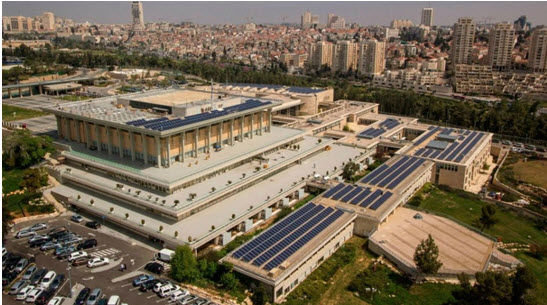On March 29, the Knesset unveiled a 4,560-square-meter array of solar panels on its roof and those of surrounding buildings. While the 1,500 panels are the highlight and the most obvious aspect of the greening of the Knesset, they are by far not the only means by which the Knesset is conserving energy. The “Green Knesset Project,” launched in January 2014, involves 13 different environmentally-conscious projects costing a total of NIS 7,000,000.
“Today we’ve come full circle. Eight years ago, we had a dream of turning the Knesset into a green parliament,” MK Dov Khenin (Hadash – Joint List), chairperson of the Knesset environmental caucus, told a group of reporters he met in a Knesset hallway on his way to the ceremony held to unveil the project.
The array of solar panels on the roof of the Knesset and its adjacent auxiliary buildings produces 450 KW of energy, more than that produced by the closest competitors –the German Reichstag in Berlin and the Australian House of Parliament in Canberra. This amounts to 10 percent of the electricity used every year by the Knesset and represents an annual saving of NIS 300,000. By comparison, only 2 percent of Israel’s electricity is currently generated from renewable energy sources. Together with additional energy-saving measures, the solar array is expected to eventually provide one-third of the Knesset’s energy needs. Built at a cost of NIS 2.4-million, the savings to be made by the solar array to the Knesset’s electricity bill are expected to cover its cost of the project within eight years.
The lighting in the hallway of the Knesset down which Khenin was walking had been switched over to the energy-saving light-emitting diode (LED) variety, as has the lighting throughout the building. “If the Knesset remains our only sole green building, then we will not have achieved our goal,” said Khenin. “While our status now is among the most advanced in the world, we hope and intend that government ministries, private businesses, and other parliaments will follow our example,” he added.



